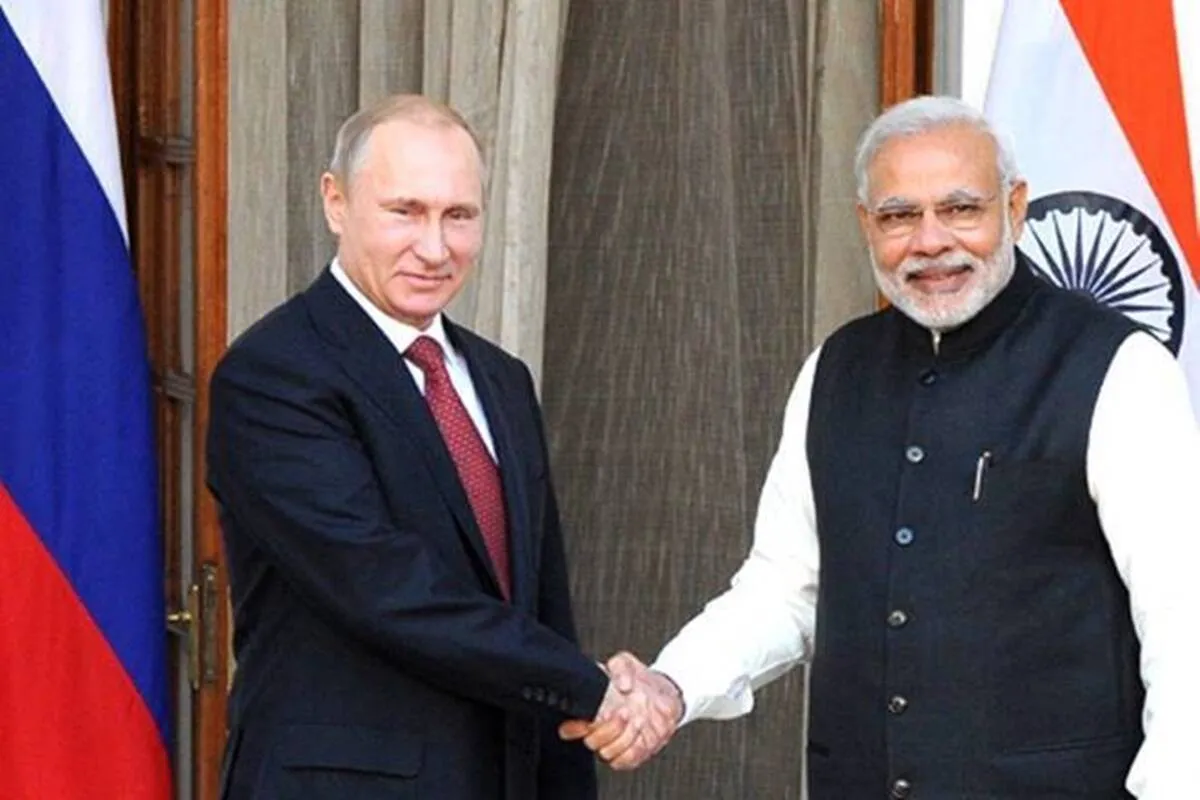
“Russia has a similar foreign policy philosophy and priorities with India, our specially privileged strategic partner. We intend to build up our truly multifaceted bilateral cooperation. We regard India as an independent, strong centre of the multipolar world.” This part of President Vladimir Putin’s remarks at the extended meeting of the Russian Foreign Ministry Collegium was music to Indian ears. The only caveat, perhaps, was his prior mentioning of ties with China that “reached the highest level in history” and are now “a model for effective interstate cooperation in the 21st century.”
Despite being very cautious about going abroad during the pandemic, Putin selected India as his first destination for a standalone foreign visit since January 2020. Moreover, the 6th of December, the date of Russian President’s arrival to New Delhi, will become a sort of Super Monday for Russia-India relations as a range of high-level engagements are slated to be held on this day. Unusually, beyond Putin-Modi talks, there will be the first ‘2+2 dialogue’ of defence and foreign ministers and a separate meeting of intergovernmental commission.
The 6th of December, the date of Russian President’s arrival to New Delhi, will become a sort of Super Monday for Russia-India relations as a range of high-level engagements are slated to be held on this day.
The time has come
It would be palatable to say that such attention toward India amounts to its exclusive significance in the list of Russia’s foreign policy priorities. However, behind the symbols and fanfare that would create the atmosphere of the long-awaited summit, there are some hardnosed reasons for Putin to finally visit India.
For one, it is the supply of S-400 surface-to-air missile system, which signifies more than just an advanced military cooperation between the two countries. By delivering these systems to India, Putin may kill two birds with one stone—demonstrating to both the US and his own electorate how Russia has successfully bypassed sanctions and, in disregard for external pressure, managed to keep on track its ties with key partners. While the delivery of S-400 has begun just recently, Moscow is ready to propose to India the next generation of these systems shortly after its induction in the Russian armed forces.
Secondly, there is a pile-up of other deals in defence and energy that have been at a protracted stage and now await a Modi-Putin handshake to move forward. Thirdly, Putin could not call off his India trip again as the deteriorating Indian public opinion of Russia began to affect the relationship. The lack of the summit last year turned out to be a tough call having coincided with a series of controversies including insensitive remarks by the Russian foreign minister on the Indo-Pacific and India-US relations and New Delhi’s discontent with exclusion from the ‘extended troika’ talks on Afghanistan and Lavrov’s visit to Pakistan.
The end of 2020 and the first half of 2021 was probably not the best period for Indo-Russian relations. It turned out, though, that difficulties unite. The Putin-Modi phone talks in April emerged as the inflection point leading to a spike in bilateral contacts. Russia’s medical aid to India in the context of a new COVID-19 wave and Sputnik V supplies provided a positive background for the cooperation going forward. The tonality of talks during Indian External Affairs Minister Dr. S. Jaishankar’s visit to Moscow in July indicated that contradictions were smoothed over. The deterioration of the situation in Afghanistan, most particularly the Kabul takeover by Taliban, also forced India and Russia to band together. And again, phone talks at the top level paved the way for intensified dialogue on the Afghan crisis.
Shifts and changes over Afghan imbroglio
Over the last decade, Moscow has viewed the region through the prism of its confrontation with the West, primarily with the US. When the relationship with Washington soured, the U.S.’ troops presence in Afghanistan had emerged as a thorn on Russia’s side. Essentially the US pullout from the region was Moscow’s idée fixe as the security establishment increasingly felt being encircled by Washington both from the Western and Southern flanks of the Russian borders.
Ironically, the US withdrawal from Afghanistan posed new security threats to Central Asian Republics and by extension to Russia. Moscow has become compelled to deliver on its commitments as part of the Collective Security Treaty Organisation (CSTO) and to secure its own territory from the potential export of terrorism and the flow of Afghan migrants via these states. More so, the Taliban’s steadfast grab of power has become a source of inspiration for radical groups across the region, including on Russian soil. While the Russian Ministry of Foreign Affairs has been keeping the Islamic State on the front burner of the immediate security threats emanating from Afghanistan, the Taliban’s jihadist ideology has also attracted admirers in Russian cities leading to appearance of terrorist cells. This leaves Moscow with a dilemma between diplomatic efforts to legitimise the Taliban government globally and keeping in force the ban of its ideology within Russian territory (for the moment the Taliban is still outlawed in Russia).
Russia’s geoeconomic ambitions in the region are often neglected. Meanwhile, as the Talibs prove their dealmaking skills in the eyes of the Russian government, Moscow has started to show a zeal for participating in commercial projects in Afghanistan. In particular, Russian railway company RZD has ramped up interaction with Uzbekistan’s counterparts on the realisation of the Trans-Afghan railway from Mazari-Sharif to Peshawar via Kabul. The project has received a fresh impetus against the backdrop of the recent talks between Pakistani and Uzbek senior officials and the representatives of Taliban cabinet where all the parties agreed to continue with its implementation.
Where does all this leave Russia-India dialogue on Afghanistan? On paper, it might seem that the much discussed ‘China-Pakistan-Russia axis’ would materialise as the three parties, guided by their close links with the Taliban, can rule over Afghan affairs. In reality, Moscow’s euphoria over the Taliban’s grab of power quickly turned into a more pragmatic approach. While generally supportive of the Taliban’s regime and giving credits for their attempts to stabilise the situation, Russian officials continue to insist on the ethno-political inclusivity of the new government and express concerns about the terrorist threat going out of control.
In its diplomatic engagements, Russia has not put all its eggs in the Beijing-Islamabad basket and has been walking a tightrope in its discussions of the Afghan crisis in different formats. Quite surprisingly, it is only with India that the special mechanism of high-level consultations on Afghanistan was established—reminiscent of the joint working group that existed in early 2000s. India is also the only country that was visited twice in a short of time by the Secretary of Russian Security Council Nikolay Patrushev.
Before the Taliban took over power in Kabul, Russia had been quite content with the Chinese presence in the region. It may turn out now, however, as the US is temporarily out of the region and China is beefing up its military presence there encroaching on Russia’s sphere of influence, that Moscow and New Delhi could share a more convergent view on preventing a new hegemon from having a free reign.
Sounding promises and grand aspirations
Apart from some nuanced changes in approach towards the Afghan crisis settlement, Russia has put a twist on its Indian Ocean policy – a region where India is predestined to be its central partner. Moscow has been seeking to step up its presence in the IOR through conducting a set of naval exercises and establishing a logistics support facility in Sudan. Signing a long overdue Reciprocal Exchange of Logistics Agreement (RELOS) with India, which is anticipated during the Putin-Modi meet, could also serve this purpose. At the diplomatic level there is a scope for interaction at the Indian Ocean Rim Association (IORA) as Russia has been granted the status of a dialogue partner. Notably, in his speech at the UNSC high-level debate on maritime security chaired by Prime Minister Modi, the Russian President underlined an interest in “building productive cooperation” with IORA and the Indian Ocean Commission (IOC). Obviously, India and Russia have not unleashed the potential of interaction on this track yet.
While there are enough reasons for Moscow and New Delhi to keep their political ties afloat— the fluid dynamics in Afghanistan and Washington-Beijing reconciliatory talks being just two examples—other domains of their bilateral dialogue also deserve attention. The biggest question is whether indeed there has been a significant shift, or as the former Indian Ambassador to Russia DB Venkatesh Varma put it, ‘a quiet revolution’ in India-Russia ties.
Relying on some big-ticket deals, mainly in defence, the two states seem satisfied with the progress made over the last two years. But the overall bilateral cooperation continues to hinge on the well-known interdependencies while its inherent nature remains the same: It is still the friendship of two states, not countries, with businesses and civil societies being left aside. With political connections being always on top of agenda, it appears equally important to ponder over how to connect the peoples of two countries. So far there has not been any determined efforts to address this issue, beyond some fine words in joint statements.
Although Kremlin’s embrace of New Delhi is a promising signal, Russia’s India policy would require a comprehensive follow-up treatment to help the relationship fully recover from the previous diseases.
The views expressed above belong to the author(s). ORF research and analyses now available on Telegram! Click here to access our curated content — blogs, longforms and interviews.




 PREV
PREV


